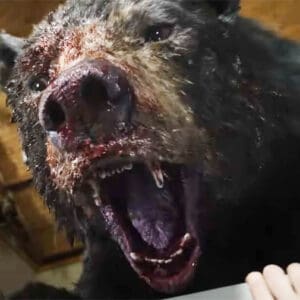
People are all the buzz about Cocaine Bear, and for all the right reasons. Not since Snakes on a Plane have audiences heard a title and thought, “Yes!” The difference here is Cocaine Bear is based on an insane true story. The marketing has been appropriately tongue-in-cheek, and the early word is that it’s a fun and breezy romp into one of the many examples of life being stranger than fiction.
The director of the film is comedic film actress Elizabeth Banks. This will be Banks’ third feature-length directorial effort after Pitch Perfect 2 and Charlie’s Angels. Recently, PETA has presented Banks with the “Beary Best Award.” The Award is given to Banks for her direction choice of using a human bear stand-in while filming the movie and CGI in a photorealistic bear rather than exploiting an actual bear for the performance.
Lisa Lange, PETA Senior Vice President has made the following statement, “Cocaine Bear’s hyper-realistic star proves that the future of film lies in technology, not dragging abused animals onto movie sets. PETA is happy to celebrate Elizabeth Banks for recognizing that forcing a real bear to perform in her dark comedy would have been anything but funny.”
Jon Favreau has also received the PETA Award for Innovation in Film back in 2016 for his work on the live-action adaptation of Disney’s The Jungle Book with his use of technology for an all animal cast. Although the animals in that story are geared toward a more fantasy element, Favreau sought to use advanced computer techniques, “It’s amazing what they can do with [creating the appearance of] fur and live-flesh animals, and so every day I go into work, it’s astounding what these visual effects artists accomplish.”
According to the organization, “PETA’s undercover investigations and law-enforcement probes into animal suppliers for the film and TV industries have documented that animals are often whipped and kept in deplorable conditions. Bears are separated from their mothers prematurely, causing a lifetime of psychological distress, and handlers typically use cruel techniques such as food deprivation, beatings, electric shocks, and chaining to break their spirits, make them compliant, and force them to perform on cue.”


















Follow the JOBLO MOVIE NETWORK
Follow us on YOUTUBE
Follow ARROW IN THE HEAD
Follow AITH on YOUTUBE